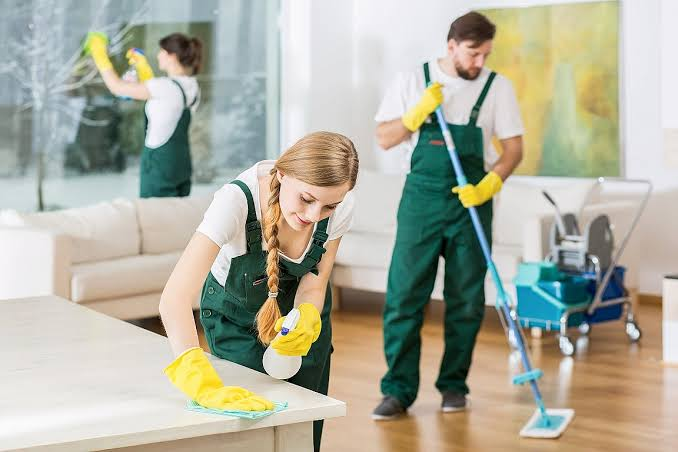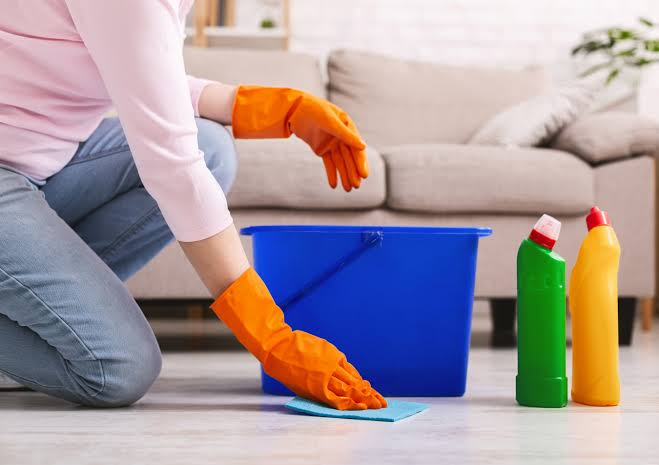WHAT TO DO IF YOUR ROOMMATE WON’T CLEAN
UP AFTER THEMSELVES
Ever heard of the phrase, “Cleanliness is next to godliness?”
Cleanliness, as you should know, is crucial to lead a quality life. It is something that must be taken seriously as it plays a paramount importance in our overall well-being and the well-being of those around us. Imbibing the habit of cleanliness steers us away from various forms of diseases. By keeping our surroundings clean, we can minimize the chances of illness and create a healthy environment for ourselves and others. Also, a clean and organized space reduces stress and improves focus. When our environment is clutter-free, we can think more clearly and work more efficiently.
When deciding to live with roommates, you must consider that you will have to share a living space with someone unfamiliar to you. They may have different standards than you. While having your place is desirable, having a roommate makes you feel less alone and lonely, and they help with the bills. There are other pros and cons of having a roommate. Pros, as aforementioned, eliminate the many chances of suffering from depression and anxiety as you will have company along the way.
Further, it will lessen your financial burden as you and your =roommates will share the bills=. These advantages are significant, but you also have to consider that sharing a space with someone means =dealing with your roommates’ visitors=. Thus, privacy is not all that prevalent. In addition, if you have a roommate who’s careless and doesn’t care about being tidy, it will grate on your nerves. What to do if your roommates won’t clean up after themselves? Build a standard. Not everyone will agree because we don’t have the same idea standards of cleaning, but there needs to be a standard in pursuing a disease-free environment. A standard everyone agrees on or agrees to live by. This way, you won’t have to carry the burden of dealing with a messy roommate.
What to do if your roommate won’t clean up after themselves
Sharing a room with someone increases or decreases the chances of having a clean place. In most cases, the other person, your roommate, is unaware of your likes or dislikes since you only get to meet them once unless you have known them for quite some time. While others may not care much about being tidy, most people will do their part to have a clean place to live. You are fortunate if you are with a roommate who values cleanliness as much as you do. Living with such a person opens doors for a safe environment and strengthens the possibility of a stress-free life.
Tell Your Roommate When They Are Not Doing Their Part
If by chance you, unfortunately, have to deal with someone who does not see cleanliness as important as drinking eight glasses of water per day, you don’t have any other choice but to confront them. In doing so, explain why it’s an issue calmly and non-judgementally. You don’t want them to think you’re trying to humiliate or pick on him; no one deserves to be treated like that. So, you must address your concern in a manner where he gets to understand your point. Remember to pick a good time and place for both or all of you; do not recklessly bring up such a private topic in a public place. And whenever you decide to discuss the problem, whether it’s the pots and pans in the kitchen sink, the mess they leave at the front door when they come in, or the homework left on the dining room table, always be calm.
Let Your Roomie Know What The Rules Are
Speaking your mind and not making others guess what you want is equally important. If you have rules you want to implement, let your roommates know. Your roommates need to know precisely what you are talking about, or they will probably not make the change you wish to have. For easy reference, the rules should be written down. In making one, make sure to include cleaning schedules for convenience’s sake. Your rules should contain the following schedules:
Do laundry on Wednesday.
Vacuum on Fridays.
Clean the kitchen immediately if you’re done cooking or eating.
Clean as you go.
The rules you set will make a difference in your goal of a clean environment.
Lead By Example
In setting up rules, your words should match with your actions. It’s important to do what you expect others to do. In short, lead by example. You can do this by marking off your chores as you do them. Or post the chores schedule on the refrigerator so others can see it immediately. If not, put it in some other conspicuous place. Remember, others will only start to do things willingly if they see that someone has initiated it. Be someone who leads actions and is confident to do so even if challenges come along the way.
Seek Mediation If You Need Help
Unfortunately, your best efforts sometimes don’t work, and you’ll need help. Your first stop should be your landlord. He can help or refer you to someone who can if you have serious issues with your roommates. However, if it’s a criminal or legal problem, you may need to inform the police or an attorney as soon as possible. If you are in a boarding school, you may need to discuss the issue with their property management team. Seeking mediation will not make you less of a person, so you don’t need to think about it twice.
Divide Responsibilities Fairly
To avoid complaints and heated conversations with your roommates, it’s essential to divide responsibilities fairly. Use a revolving schedule: one week per person doing a particular chore. The following week, let someone else do the same specific tasks. This is a fair way to divide the workload.
Implement Consequences
In every action made, there will either be a good or bad outcome. When you realize that your rules did not work as planned, you must think of other efficient ways. If your roommate won’t clean up for themselves, you can implement consequences. This will enable you or your roommate to act accordingly and do their part well. And if the negligence is bad enough, they may be required to leave. Or have the matter taken up with the property manager. Discuss your concerns carefully, and make them understand why there is a need to come up with consequences. Only then will you convince them to take part in maintaining cleanliness within your premises?
Know When To Escalate
Both you and your roommate must understand the importance of being responsible. And while it is certainly justifiable to make others realize their mistakes by implementing a set of conditions, no one should be removed from their housing over one minor infraction. Yes, everyone living under the same roof should know the rules, and there should be consequences for not conforming to cleanliness, but one small display of slackness should not be enough reason to kick someone out of the house or, in this case, the room. Be fair, and the consequences should meet the infraction. If they still fail to recognize their shortcomings, you’ll have to think of ways to make them leave for good. Live by the principle, “Enough is enough.”
Conclusion
When one decides to live an independent life, there will be hurdles. It’s not easy, especially if the landlord sets you up with a roommate who thinks of engaging in clean-up activities as a waste of time. If you share a room with this kind of person, Friday the 13th won’t bother you as much as before because you are already unlucky having to deal with such. Considering what to do if your roommate won’t clean up after themselves requires little time and consideration. Cleanliness should be a collaborative effort between you and your roommate. If one neglects his responsibilities, the other’s overall well-being will be affected. That is why everyone in the room should learn to grasp the significance of having a clean space. And if still, they fail to do so, as someone who values cleanliness, step up and address the issue to your landlord proactively and respectfully.



